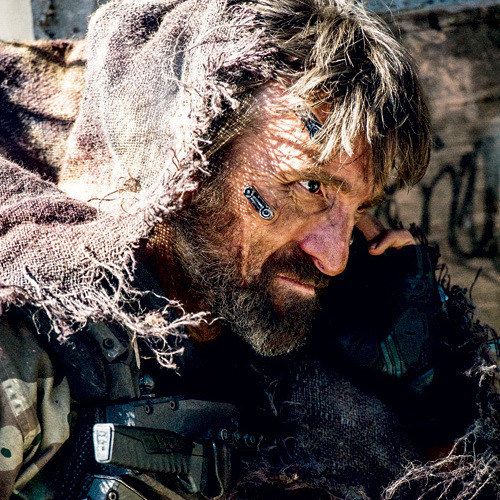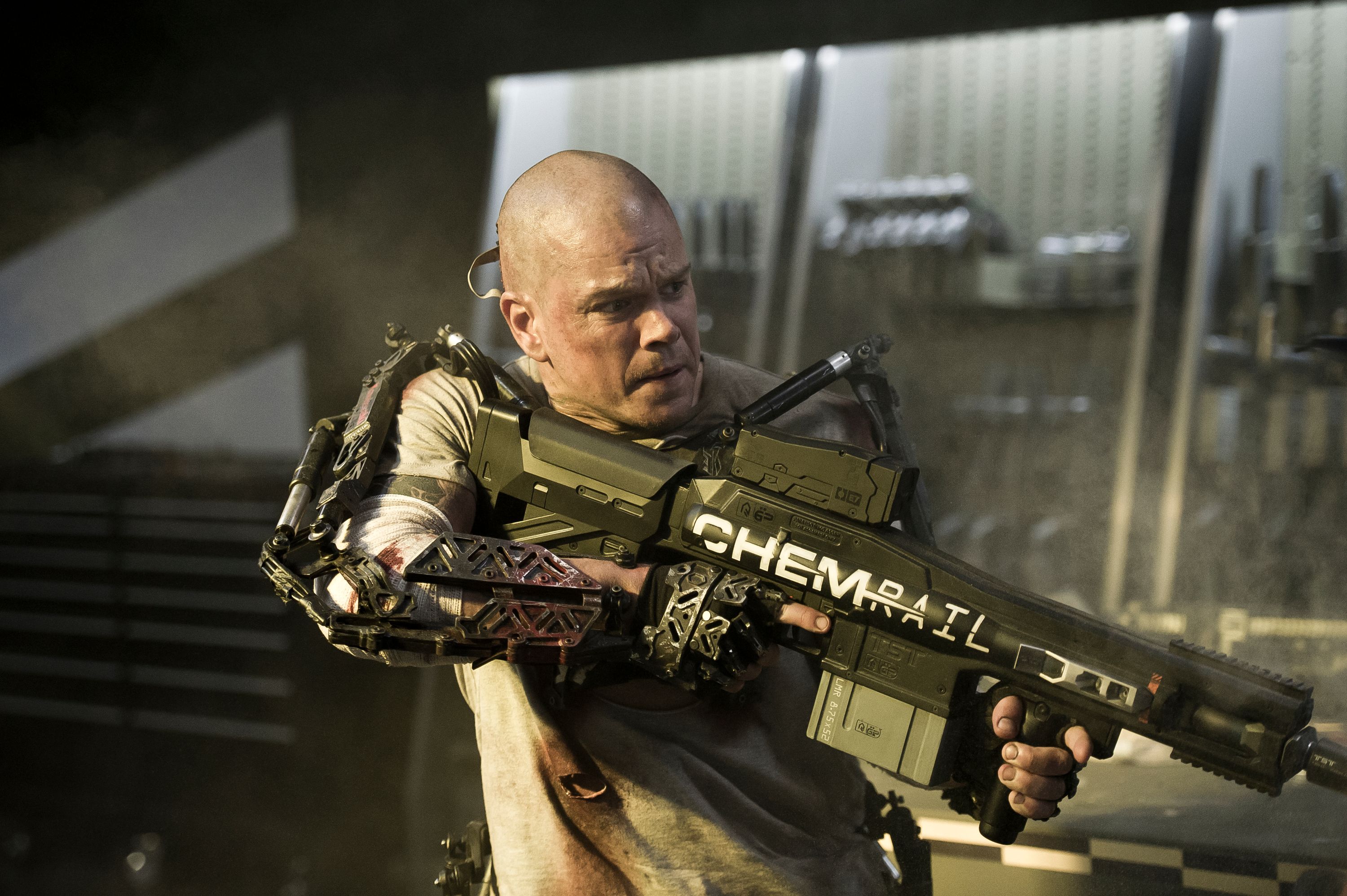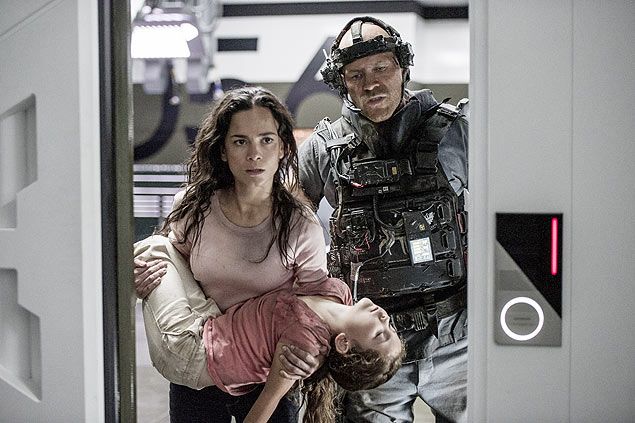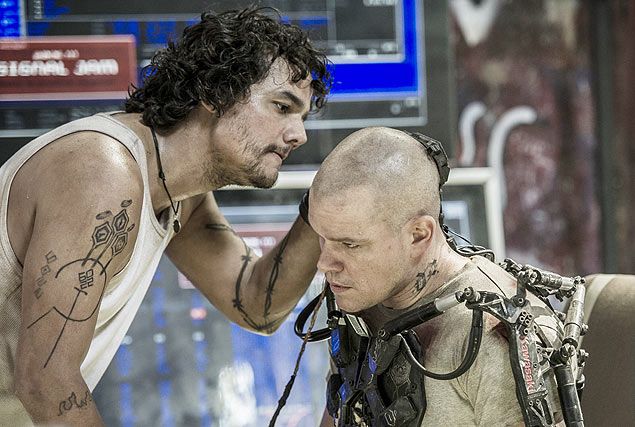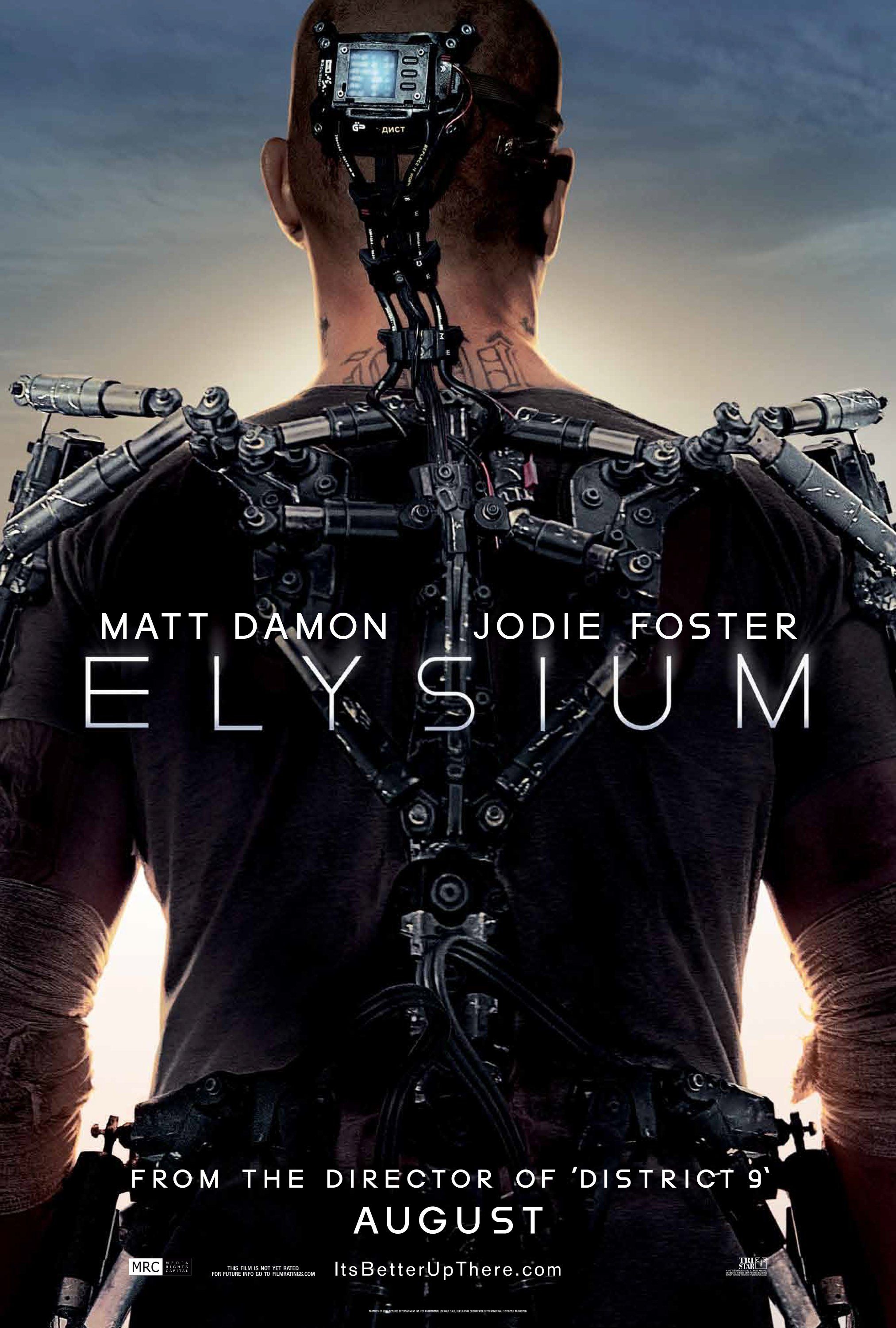Director Neill Blomkamp, star Sharlto Copley, and producer Simon Kinberg joined us in Los Angeles, with Matt Damon joining the discussion via a live feed that was streamed from a packed theater in Berlin, Germany. After Matt Damon thanked everyone for "skipping work or school" to be there, we were shown the first trailer, which will debut later today. We are shown the lush amenities that the Elysium space station has to offer - home to the world's elite and most wealthy citizens while the rest of the Earth's population live on an overpopulated and decaying Earth below. One of the luxuries of Elysium that we see right away is when an attractive woman gets into a tanning booth, and the computer identifies trace elements of cancer in her system, which are removed within seconds. We also meet Max De Costa (Matt Damon), a lowly Earth resident who desperately needs to get to Elysium, along with a number of fantastic action sequences that will surely whet any action and/or sci-fi fan's appetite to see this film.
We were also shown approximately 10 minutes worth of never-before-seen footage, which the director and producer explained would only be seen by us until the film's general release on August 9. The scenes start out on Earth, and we got a better sense at how run-down the planet has become. Abandoned skyscrapers have massive amounts of foliage growing off them. We also get our first look at Sharlto Copley's villainous Kruger, an Elysium citizen who works as, essentially, a secret agent on Earth, thwarting various attacks on the space colony from his base on the dilapidated planet. One scene shows Kruger's boss, Secretary Rhodes (Jodie Foster) "activating" him from Elysium, ordering him to stop three unauthorized ships who are heading towards Elysium.
The next scene gives us a proper introduction to Matt Damon's Max De Costa, who is standing in a massive line waiting to go into his lowly job. When a group of robotic cops accost him, asking Max what is in his bag, Max's sarcastic response ("Hair care products, mostly") doesn't go over too well with these very crude versions of Robocop, causing them to break his arm. Max is then sent to the hospital, where he meets Alice Braga's character, a nurse with whom he appears to have a history with, and then to a border patrol agent, which we first saw at Comic-Con 2012 and bears a slight resemblance in appearance and tone to the Johnny Cab from Total Recall.
We next see Max back at work, where his supervisor is none too happy with him coming in late, again. It's clear that Max is on his last legs at this job, which forces him into doing something he doesn't want to do, or else he'll be fired. When Max enters this bizarre chamber, he is trapped inside, and infected with some sort of radiation that will kill him in a matter of days. This is why he is so desperate to get to Elysium, because they can fix him there. This leads into our next scene where Max teams up with a shady group of miscreants who outfit him with a "Hulk suit," a crude biomechanical suit that enhances his strength. They go on a mission to kidnap and download data from John Carlyle (William Fichtner), an Elysium resident whose ship crashes on Earth. After a fantastic firefight between Max, his new friends, and the droids assigned to protect Carlyle, Max completes his mission, now possessing the data that can potentially override the entire system.
Fans of Neill Blomkamp's first film, District 9, will likely be highly impressed by the trailer and this footage, if it ever is released before the August 9 release date. Seeing is believing, so they say, and everything I saw made me a believer that Elysium will be a fantastic sci-fi thriller, chocked with fantastic action set pieces and intriguing social commentary as well.
Elysium Q&A - Director Neill Blomkamp, Actor Sharlto Copley, and Producer Simon Kinberg:
How much of the movie takes place going into space, and how much of it takes place on Earth?
Neill Blomkamp: Definitely, a majority of the film takes place on Earth. It's probably 2/3 on Earth and 1/3 Elysium. The whole aspiration of the protagonist is to get there.
Can you talk about how much, if at all, the Occupy movement and the understanding 99% impacted this movie?
Neill Blomkamp: Hopefully, it didn't impact it at all. I think they are just topics that are on people's minds, and things manifest out of reality, this global consciousness. Separate from the Occupy movement and the 99% discussion, I was thinking of this throughout that. I remember reading something about Christopher Nolan trying to film some Occupy movement for The Dark Knight Rises. That was the first time that I realized I was making a film that, in terms of social consciousness, fit into a CNN sound bite. They've always come from the same place. I just don't want it to be fast food and throwaway, if that makes sense.
Can you talk about Max's apparatus, in terms of the story, and how long it took Matt to suit up?
Neill Blomkamp: In terms of the story, it's funny because there's product placement in this film. I personally wrote emails to companies I wanted to get into the film, to try to add realism to it. One of my favorite ones is Kawasaki, which you see on his suit. The idea was, it was this very low-end, almost like a dirtbike, motorcross version of a strength suit, that was born out of research and development. Like, Lockheed (Martin) and a bunch of other companies have Hulk suits for enhanced strength. I just wanted it to look really grungy and extremely low end and kind of real. That was the thinking, and he's sick in the film, so it makes him stronger but it doesn't make him Iron Man strong. Then, in a practical application, there's a surprising amount of engineering, for the range of motion, to work correctly. Sharlto (Copley) has one, later on in the film, that is a bit more advanced than Matt's.
Can you talk a bit about Kruger's look in the film? You see these metal pieces in his face. When you were casting the film, was it the idea to the opposite of his character in District 9?
Sharlto Copley: Those units are guys who could just go in the bush and not come out for like three months. It's a very specific type of soldiering. It's not like, 'Oh, I look cool in my Oakley's.' It's a different type of person.
What are those metal implants on his face?
Neill Blomkamp: Later on, we also have them on his body. Basically, they're like metal implants that are drilled into his bone. They just click on and off. One is for night vision.
Do we get any sort of history of how Elysium all started?
Neill Blomkamp: I like films that just put you there, and you have to deal with it. There was a more aggressive version of the film, where the intro was virtually non-existent. There is this space station, and you have to keep up with it. I shot some footage that explains the intro a little bit more, but I decided not to use it. I'd say it's about half-way. There is some explanation, but it's definitely not over the top.
You seem to have a firm grasp on futurism and realistic interpretations of where we might be. Did you consult with anyone on that?
Neill Blomkamp: Not really. I think that if you really want to make a proper, speculative, piece of science fiction, it's a very different product that you end up with. In this film, proper science is thrown out the window a little bit, in favor of metaphor or plot. Actually, less plot, more to make the mechanics work. Building a space station with marble and slate is not that smart. That's not something you want to do, but the metaphor of Bel Air in space, is correct. My approach is start off with something ridiculous, then try to use the most realistic portrayal of the ridiculous, as you can. It's kind of like I'm painting ridiculous ideas.
Simon Kinberg: There are even small details like, on Elysium, people use paper. The assumption would be, in 100 plus, there wouldn't be paper, but it makes it relatable and real and connects to today's world in a way that's unconscious.
Do you see yourselves as "smugglers" of ideas, to try and fit current notions into your films?
You talked about shooting in Mexico City. Can you talk about the differences between shooting there and Johannesburg?
Neill Blomkamp: I can summarize it pretty quickly. Mexico City is all about kidnappings, and Joburg is all about carjackings. The security team had done a lot of research. In the areas we were in, the chance of random impulse crime was extremely low, and the chance of a two-to-three week pre-meditated kidnapping was much, much, higher. Johannesburg was the inverse of that. There is extreme wealth, and then extreme poverty. Obviously, we chose extreme poverty, because (Vancouver) Canada represented the wealth.
Sharlto Copley: Yeah, there were a lot of similar things. I felt safer in Mexico because of the kidnapping thing. I was like, 'Well, they're going to go for Matt Damon before they go for me.' I was like, 'Hey, brothers! I'm from South Africa! I'm a third world guy! Take the producer. He's American.' I felt OK, but it was the scale of Mexico City that surprised me. The sheer size of the place was astounding. It just goes on, and on, and on. Not as much shacks, like you have in South Africa, but a consistent level of just blocks and blocks and blocks.
Can people on Earth be selected to go to Elysium?
Neill Blomkamp: No, it's all money. If you have the money, you can go. It's pretty self-selective.
One of the things I've liked, is you're doing wholly original pieces. Would you ever circle back to this world, or the world of District 9?
Neill Blomkamp: I don't actively sit down and say I'm going to do my own stuff and that I want everything to be original. One of the things I learned with Halo... I actually still really like the world and universe of Halo and if I was given control, I would like to do that film. But that's the problem. When something pre-exists there's this idea of 'I have my interpretation of what that is' but along with it comes like 150 other people involved with the film's interpretation of the same intellectual property. And then the entire filmgoing audience has their interpretation. And you can live up to or fail in their eyes. And that part of it isn't appealing to me. But the original pieces are appealing. In terms of sequels to my own stuff, a lot of it just comes down to if there's more to say. And I think the world of District 9 has a lot of very interesting race and oppression-based ideas that I would still like to explore in that world. Again, I have zero problems, I'll make my own stuff or whatever you want to call it, sequalize my own stuff. And then there's a few pieces of cinema history that I like so much I don't know whether I could be involved with them. There's, you know, there's iconic characters that I really like that I would love to get closer to and make a film about. When I start dipping my toes into it, I get this allergic reaction. Maybe one day I'll end up doing something like that.
Neill Blomkamp: On Elysium, the idea is it's a mirror of how the West is now with immigration. A lot of people want to help out the rest of the world, and they want to take that wealth pour it out like a glass on half the planet. Other people want controlled borders.
Sharlto Copley: With Kruger, the issue is more with politicians and soldiers. He's living among the squalor, but he would be on Elysium. He's one of them, but he has to live here. That's not the politics of what's happening, whether it's fair or not. It's just soldiering. It's that kind of gung-ho soldiering attitude from my guys.
Can you talk a bit more about William Fichtner's character Carlyle? He had a tone and cadence that sounded robotic.
Neill Blomkamp: The cadence isn't robotic. There's a bit of satire throughout the whole film, and, with Carlyle, the satire is turned up a little bit more. He's just a billionaire who is uninterested in the small people that get in the way of him making a profit. That cadence is he acts with almost no emotion. There are some scenes that are pretty funny. He's just rich and extremely elitist.
Is there any commentary there on some of the people you've dealt with in Hollywood?
Neill Blomkamp: Um... yes.
That wraps up my day in Hollywood with the filmmakers and actors from Elysium, which debuts in theaters August 9. After watching the footage they showed today, it is going to be an unbearably long five months before finally getting to see this in theaters.

